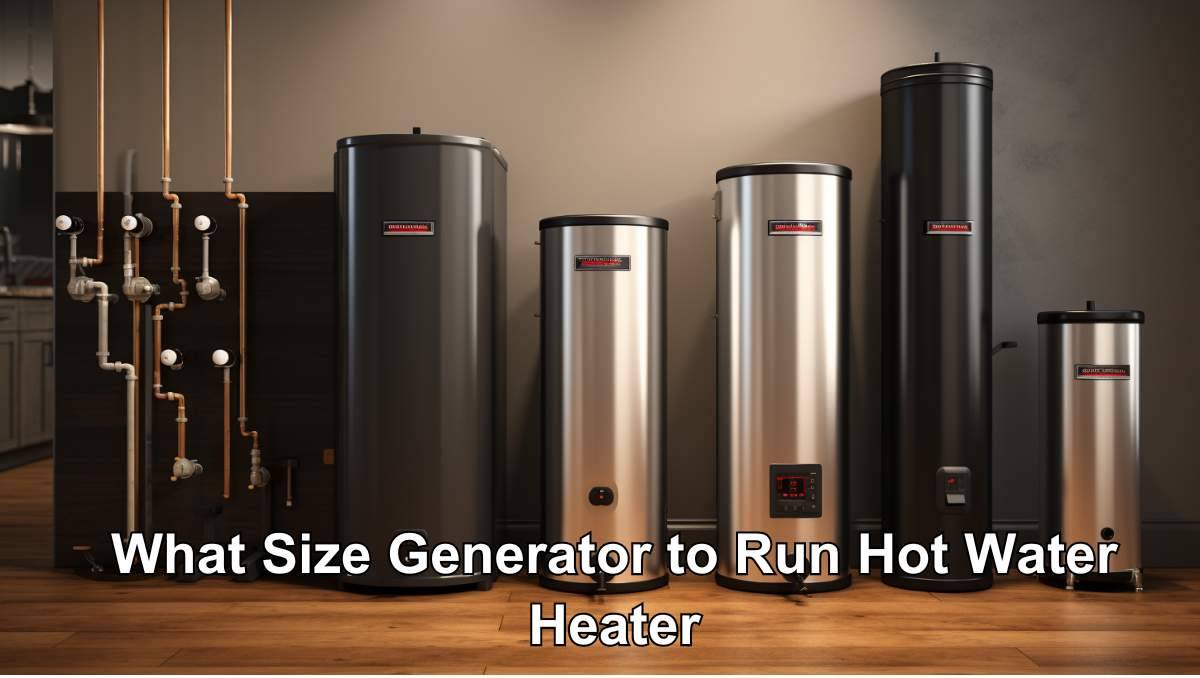Last Updated on September 28, 2023 by kiezelamquiz
There is no better feeling than having your water heater running smoothly during chilly mornings when the power is out. Your hot water heater is your trusted partner in ensuring you never miss out on a cozy shower, no matter the situation. Choosing the right generator size for your hot water heater to keep it flowing even when the power takes a break is essential.
To run hot water heater, you want a generator size that can give you at least 50% more power than the tools you want to use. For example, if your hot water heater uses 4000 watts, you will need at least a 6000-watt generator.
In this article, we will help you determine what size generator is needed to run your hot water heater efficiently. We will also explore different types of water heaters, safety considerations, and everything you need to know about installing a generator for your hot water heater.
Can You Hook up a Hot Water Heater to a Generator?

The short answer is yes, you can hook up a hot water heater to a generator. And you can do it safely.
Yet, there are a few things you need to consider.
Firstly, make sure that your generator has enough power to meet the requirements of your hot water heater. Hot water heaters typically require around 4,500-5,000 watts of power. So ensure that your generator can produce at least this amount of power.
So, will a 5000-watt generator run a hot water heater?
It depends on the wattage requirements of your specific hot water heater and any other appliances or devices connected to the generator. 5000 watts is a decent amount of power, and it should be sufficient to run a typical electric hot water heater with a wattage requirement within that range.
It’s important to note that hot water heaters can have varying wattage needs based on factors such as the size of the heater, efficiency, and heating elements. Before using, check the wattage rating of your hot water heater and consider any additional appliances or devices that might be connected to the generator simultaneously. Make sure the combined wattage does not exceed the generator’s capacity.
Secondly, remember that hooking your hot water heater to a generator should only be a backup option during power outages. Due to fuel consumption and maintenance requirements, it’s not recommended for everyday use.
Generators consume fuel at varying rates depending on their size and load, so remember the fuel your generator will require when running the hot water heater.
How to Size a Generator for a Hot Water Heater
To ensure your hot water stays consistently warm, it’s crucial to determine the appropriate power capacity for operating your water heating system. Sizing calculations are crucial in determining the suitable generator capacity for your water heater.
First, you need to determine the power requirements of your specific water heater model. This information can usually be found in the manufacturer’s documentation or the unit itself. Once you have this information, you can proceed with sizing the generator.
Generator capacity is measured in kilowatts (kW), and it should match or exceed the power requirements of your hot water heater. Choosing a generator that provides enough power to meet peak demand during operation is essential.
When selecting the best generator for your hot water heater, consider fuel options that suit your needs and preferences. Common options include gasoline, diesel, natural gas, and propane generators.
Additionally, ensure proper electrical connections between the generator and hot water heater. Following all safety guidelines and consulting an electrician if needed is crucial.
By accurately choosing the generator size for your hot water heater using these sizing calculations, considering fuel options, and ensuring proper electrical connections, you can enjoy consistent warm showers without interruptions or inconvenience.
Different Types of Water Heaters

Before you decide what size generator to get for your water heater, you must know what type of hot water heater you have at home.
There are various options available when it comes to choosing the right type of water heating system for your needs. When considering different types of water heaters, it’s essential to understand their energy efficiency and how they operate.
Tankless Water Heater
One option is a tankless water heater, which provides hot water on demand without needing a storage tank. These units heat the water as it flows through the unit, resulting in energy savings compared to traditional tank water heaters. Tankless water heaters are often more expensive upfront but can save you money in the long run due to their energy efficiency.
Electric vs. Gas Water Heater
When comparing electric vs. gas water heaters, some key differences exist.
Electric models tend to be cheaper upfront and have lower installation costs, but they may have higher operating costs over time due to electricity expenses. Gas models typically have higher upfront costs but can be more cost-effective in terms of monthly utility bills.
How many watts does a gas water heater use?
The wattage consumption of a gas water heater is relatively low compared to electric water heaters. Gas water heaters primarily use electricity for ignition and control mechanisms, but the primary heating source comes from burning natural gas or propane. The electrical usage is generally around 400 to 600 watts for the ignition system and controls.
Remember that most of the energy used by a gas water heater comes from the combustion of the gas, not from electricity. The wattage mentioned here is primarily for the electrical components that enable the gas heater to function.
Understanding the different types of water heaters available can help you make an informed decision based on your energy efficiency goals and budgetary constraints. Whether you opt for a tankless, electric, or gas model, each type has its advantages that cater to your needs.
What Size Generator To Run Hot Water Heater
When you’re looking to power your water heater, it’s essential to consider the appropriate capacity of the generator. The generator capacity refers to its ability to produce enough electricity to meet the power requirements of your hot water heater.
To determine the size of the generator you need, you should first check the specifications of your water heater for its power requirements.
The power requirements of a hot water heater can vary depending on its size and type. For example, electric tankless water heaters generally require more power than electric storage tank heaters. Gas-powered heaters also have their own specific power needs.
Once you know the power requirements, you can select a generator with sufficient capacity.
Matching Water Heater and Generator Sizes
Here’s a table with the water heater size represented in gallons and their wattage, and the corresponding generator size for your reference:
| Water Heater Size | Generator Size (Watts) |
| Below 10 gallon (approximately below 1500 watts) | at least 2000 watts |
| 10-20 gallon (approximately 1000-2000 watts) | at least 3000 watts |
| 30-50 gallon (at least 4500 watts) | 4500-6000 watts |
| 60-80 gallon (at least 5000 watts) | 7000-8000 watts |
| 90-100 gallon (5000 watts or more) | at least 9000 watts |
Please remember that these generator sizes are provided as estimates and may vary based on factors like water heater efficiency, startup surge, and running wattage. Always consult the manufacturer’s guidelines and consider your power requirements when selecting a generator size.
Another important factor is fuel consumption. Portable generators often run on gasoline or propane and consume fuel at different rates, so choosing one that will provide enough runtime without constantly refueling is crucial. On the other hand, standby generators are usually connected directly to a natural gas or propane line, providing a continuous fuel supply.
By carefully assessing these factors, you can ensure that your generator meets your hot water heating needs efficiently and effectively while staying within budget constraints.
After understanding the right size generator needed to run your hot water heater efficiently, you might be interested in finding the best generator for your boiler systems.
Safety Considerations

Safety is paramount when setting up a generator for your hot water heating system, especially to prevent the risk of fire.
- Consult an electrician to determine the appropriate generator size to power your water heater effectively. This will ensure that the generator can handle the electrical load without any risk of overheating or electrical failure.
- Ensure that the area where the generator is installed has adequate air circulation and proper exhaust systems.
- It is essential to note whether you have a gas or electric water heater, as this will impact safety considerations. Gas water heaters require additional precautions due to their combustion process and the potential for gas leaks. Electric water heaters also have their specific requirements regarding wiring and power supply.
- Familiarize yourself with emergency shut-off procedures in case of malfunction or hazardous situations.
By following these safety guidelines, you can ensure the safe installation and operation of your hot water heating system with a generator.
Choosing the Right Generator Size for Your Hot Water Heater: Power and Balance
Understanding how to select the right generator size for your hot water heater is crucial to meet your needs effectively. Take into account the wattage of your heater and other appliances you wish to run concurrently to guarantee your generator’s efficiency and reliability.
Safety should always be at the forefront when setting up a generator. Always adhere to recommended guidelines and consider professional assistance when in doubt. With this essential insight, uninterrupted hot showers during power disruptions are well within reach!

Scott Krager purchased generatorgrid.com in the summer of 2020 and quickly began to buy every generator under the sun! He currently has over a dozen generators and the number is growing quickly. He lives in Portland, OR near his family and friends.
GeneratorGrid.com is an independent review business. I am not affiliated with any manufacturers and do not accept paid reviews. When you buy through my links, I may earn a commission which helps me purchase more generators for testing. - Scott Krager


